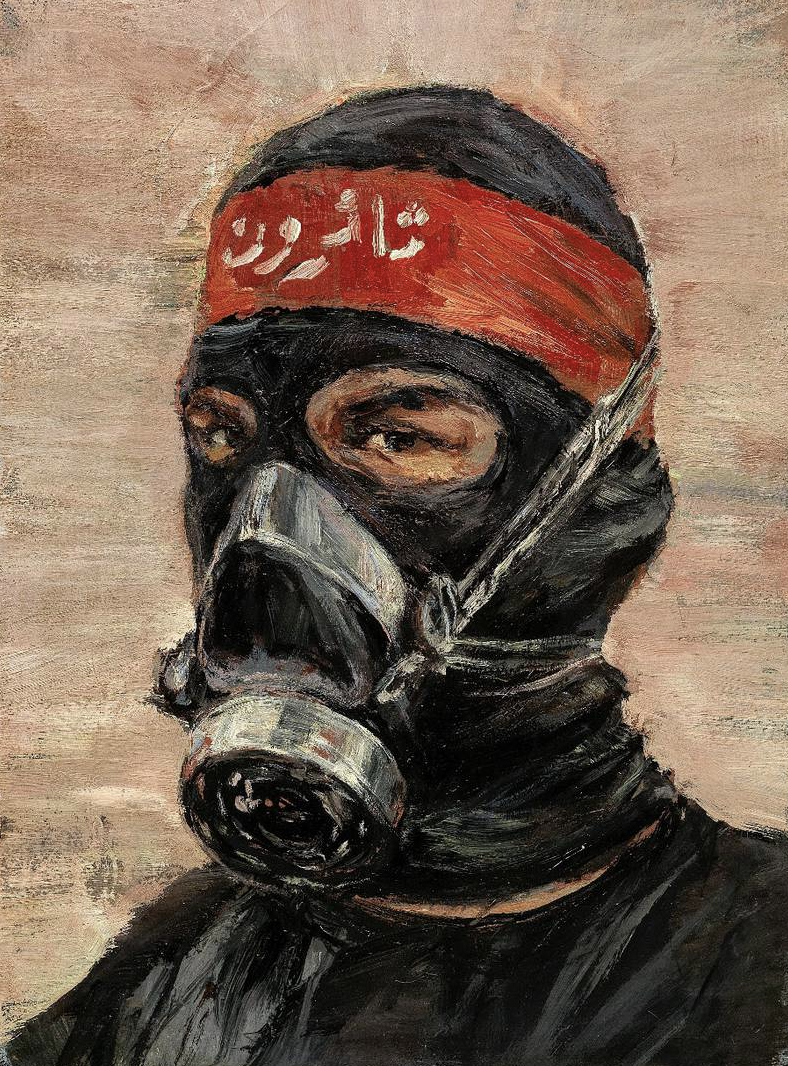The last few days have seen a succession of scandals on the Western art scene, starting with Christies' decision to withdraw from its catalogue two works by Ayman Baalbaki, due to go on sale in London on 9 November. "Al-Moulatham" and "Anonymous" are two paintings depicting a man whose face is concealed by a keffiyeh and another wearing a gas mask with a red band bearing the Arabic word "rebels". However, the decision to withdraw the painting was taken directly by Christie's New York office.
When asked about this controversy, which directly affects his work, Ayman Baalbaki described it as "censorship without a name. They want to censor a certain art, a certain Arab culture. This story reminds me of the label of degenerate art used by the Nazis to suppress the works of Jewish or Communist artists who had modern approaches, on the pretext that they constituted an insult to German national sentiment".
This indignation is all the more legitimate given that it was Moulatham's series, inspired by the events of 1975 in Lebanon (the very year of his birth) and begun in 2006, that helped establish the Lebanese artist's international reputation. It is his recurring depictions of the fida'i (freedom fighter to the point of sacrifice) wearing the keffiyeh scarf that have earned him recognition as one of the leading figures on the Arab art scene.
On 2 November, the American Museum of Pittsburgh announced that it was postponing its exhibition on Islamic art for fear of offending the Jewish community, thus helping to perpetuate the stereotype pitting Muslims against Jews and associating Islamic art with terrorism and anti-Semitism.
On 28 October, Artforum's editor-in-chief, David Velasco, was sacked following an open letter calling for emergency humanitarian aid for Gaza. He is leaving Artforum after 18 years, including six as editor. In an e-mail to the New York Times, he wrote: "I have no regrets. I am disappointed that a magazine that has always defended freedom of expression and the voice of artists has bowed to outside pressure.
The Royal Ontario Museum had also decided to withdraw works by Palestinian artists as part of the exhibition "Death: Life's Greatest Mystery", which was due to open on 3 November. Jenin Yaseen and Sameerah Ahmad organised an 18-hour sit-in at the museum in reaction to the management's decision. Yaseen told the "Hyperallergic" media that the museum wanted to reframe its reproduction of his painting depicting a traditional Islamic funeral ritual in order to remove the image of a dead Palestinian being pulled from a grave by soldiers. The museum apologised and reinstated the works.
The University of Potsdam has postponed a discussion with the Palestinian artist Emily Jacir, who was due to be held in Berlin at the Hamburger Bahnof. Jacir was awarded the Golden Lion for artists under 40 at the 52nd Venice Film Festival.
The Academy of Fine Arts in Vienna cancelled a lecture by economist Yanis Varoufakis, without giving any explanation. An open letter from the students challenged the decision: "We, architecture students of the IKA, Academy of Fine Arts Vienna (...) call upon the IKA to issue an apology to Yanis Varoufakis, that underlines the legitimacy of speaking out against Israel's Apartheid/Occupation."
Litprom has also cancelled the award of the Litprom prize to Palestinian author Adania Shibli for her novel "A Minor Detail" at the Frankfurt International Book Fair.
Finally, the municipality of Choisy le Roi in France cancelled the play "And Here I am" put on by The Freedom Theater, from Jenin.
Photo: "Anonymous" from the eponymous series produced between 2011 and 2018. Copyrights Ayman Baalbaki.
